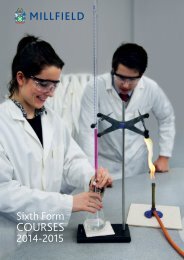COURSES
You also want an ePaper? Increase the reach of your titles
YUMPU automatically turns print PDFs into web optimized ePapers that Google loves.
History<br />
Overview<br />
“What’s the point, it’s all about dead people.”<br />
“It’s all bunk, you can’t learn anything from the past.”<br />
“Why bother with all that old stuff – it’s all been<br />
and gone.”<br />
“History can’t teach you anything, so why bother<br />
studying it.”<br />
Familiar cries from the doubters who see little point<br />
in studying history. How wrong they are. On a<br />
practical level, the study of history develops crucial<br />
skills, which are totally relevant to a wide range of<br />
careers, including journalism and law. Far from being<br />
dead and irrelevant, history is all around us and<br />
affects our lives in a multitude of ways. An<br />
understanding and awareness of it is vital for<br />
making sense of the present, and perhaps the future,<br />
of our world.<br />
The deluge of history TV programmes and books,<br />
whether factual or fictional, is a testament to<br />
people’s thirst for a deeper knowledge of history.<br />
Many regret not having learnt more about it when<br />
they were young. You have the chance, and in an<br />
age when the teaching of history is so colourful<br />
and vibrant.<br />
The department is proud of the number of its A level<br />
pupils who have gone on to read history at top<br />
universities, including recent entrants to Cambridge.<br />
Approach<br />
There is an emphasis on seminar style teaching and<br />
learning at AS and A2. The tutors at Millfield are very<br />
knowledgeable and good at what they do, but the<br />
more you are prepared to read around the subject<br />
outside the classroom, the more you will get out of<br />
your lessons. There is no coursework element at AS;<br />
you will be assessed through your ability to write<br />
effective essays in the ‘period study’ and evaluate<br />
historical documents in the ‘enquiry.’ For both these<br />
papers the most successful pupils will be those who<br />
are able to write and communicate effectively, while<br />
being in full command of the historical facts.<br />
History goes very well in combination with all other<br />
arts subjects, and is also successfully studied by<br />
science pupils who are looking for a more balanced<br />
combination of subjects. It is a subject highly regarded<br />
by both university admissions tutors and employers,<br />
as the skills it teaches – the ability to gather together<br />
information, analyse it and present conclusions –<br />
are valuable for so many different courses and<br />
professions.<br />
Course outline<br />
At Millfield a number of different options are offered,<br />
and it is possible to express some preference for<br />
what you want to study. In the Lower Sixth (AS) all<br />
pupils must study a British option and a European<br />
option and we feel that pupils develop into better<br />
historians if they have studied more than one period<br />
of history. Currently the following options are on<br />
offer: the Norman Conquest, Gladstone and Disraeli,<br />
The Crusades, the Cold War, twentieth century<br />
Russia and Elizabeth I.<br />
In the Upper Sixth (A2), pupils build on their Lower<br />
Sixth options, studying such topics as twelfth<br />
century England, Tudor rebellions, the causes of<br />
World War Two, the Cold War, civil rights in America<br />
and the war in Vietnam.<br />
Not all these options are always available, and only<br />
certain combinations are possible: for full details of<br />
what is available you should see your history tutor.<br />
At AS level, pupils take an essay paper and a<br />
documents paper, each worth 50% of the AS marks.<br />
The essay develops a skill already tackled in some of<br />
the longer answer questions asked at GCSE, and<br />
requires pupils to write analytical responses to open<br />
ended questions asking ‘How far…’ or ‘To what<br />
extent…’. The documents paper asks questions<br />
which again build on the skills of source handling<br />
and evaluation which were learnt at GCSE.<br />
48<br />
Millfield Sixth Form Courses 2014-2015



